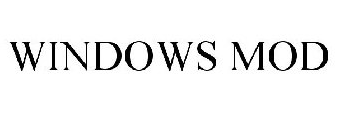Microsoft applies for trademark on 'Mod'

Back on December 9, Microsoft applied to the U.S. Patent and Trademark Office for a trademark on "Mod."

Might this be Microsoft's long-awaited replacement for "Metro"? In August 2012, just before launching Windows 8, Microsoft officials conceded that the company would no longer be using "Metro" to describe the tiled interface and design language at the heart of its Windows Phone and Windows operating systems. Though Microsoft officials never admitted publicly the reason for the pull-back, a naming dispute with the German partner Metro Group is believed to be the reason behind Microsoft's Metro naming crisis.
Since that time, different teams at Microsoft have used different words as substitutes for "Metro" and "Metro-Style." Some teams have favored "immersive," while others have used "Windows Store" or "Windows 8." And still others have used the word "Modern" as the replacement for Metro.
As NeoWin reported on December 28, Microsoft has applied for trademarks for "Windows Mod," "Office Mod" and "Microsoft Office Mod." Maybe Office Mod is the hoped-for name for the Metro-Style versions of the four core Office apps Microsoft is building (as part of the codename "Gemini" wave)?
Perhaps Mod will be the new Metro. Or perhaps it's something else entirely. One of my contacts said he wondered whether "Mod" might be shorthand for "module." Maybe Microsoft's Windows Mod and Office Mod -- should the trademark application win approval -- will simply be some kind of new programming aid to help developers build more Microsoft-centric apps?
I've asked Microsoft officials for comment on the trademark filing. If I get a response, I'll update this post.
It's worth noting Microsoft applies for many trademarks it never ends up using commercially or publicly. Still, this one is intriguing....